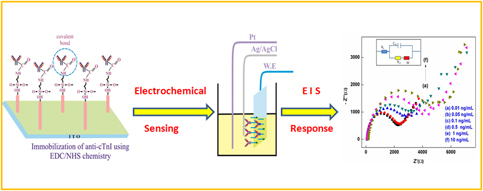Crossref Citations
This article has been cited by the following publications. This list is generated based on data provided by
Crossref.
Tu, Jiaobing
Torrente‐Rodríguez, Rebeca M.
Wang, Minqiang
and
Gao, Wei
2020.
The Era of Digital Health: A Review of Portable and Wearable Affinity Biosensors.
Advanced Functional Materials,
Vol. 30,
Issue. 29,
Chauhan, Dipti
Pooja
Nirbhaya, Vishakha
Srivastava, Chandra Mohan
Chandra, Ramesh
and
Kumar, Suveen
2020.
Nanostructured transition metal chalcogenide embedded on reduced graphene oxide based highly efficient biosensor for cardiovascular disease detection.
Microchemical Journal,
Vol. 155,
Issue. ,
p.
104697.
Shi, Chaohong
Xie, Haotian
Ma, Yifan
Yang, Zhaogang
and
Zhang, Jingjing
2020.
Nanoscale Technologies in Highly Sensitive Diagnosis of Cardiovascular Diseases.
Frontiers in Bioengineering and Biotechnology,
Vol. 8,
Issue. ,
Magar, Hend S.
Hassan, Rabeay Y. A.
and
Mulchandani, Ashok
2021.
Electrochemical Impedance Spectroscopy (EIS): Principles, Construction, and Biosensing Applications.
Sensors,
Vol. 21,
Issue. 19,
p.
6578.
Richard, Yesurajan Allwin
and
Venkataraman, Dharuman
2021.
Electrochemical Ultrasensitive Label Free Escherichia Coli DNA Detection at Gold Decorated Tungsten Oxide Nanoparticles Modified Electrode Surface.
Journal of The Electrochemical Society,
Vol. 168,
Issue. 10,
p.
106514.
Taniselass, S.
Arshad, Mohd Khairuddin Md
Gopinath, Subash C. B.
Fathil, M. F. M.
Ibau, C.
and
Anbu, Periasamy
2021.
Impedimetric cardiac biomarker determination in serum mediated by epoxy and hydroxyl of reduced graphene oxide on gold array microelectrodes.
Microchimica Acta,
Vol. 188,
Issue. 8,
Khatri, Ritika
and
Puri, Nitin K.
2022.
Electrochemical biosensor utilizing dual-mode output for detection of lung cancer biomarker based on reduced graphene oxide-modified reduced-molybdenum disulfide multi-layered nanosheets.
Journal of Materials Research,
Vol. 37,
Issue. 8,
p.
1451.
Sandil, Deepika
and
Puri, Nitin
2022.
Metal Oxides for Biomedical and Biosensor Applications.
p.
353.
Du, Xuewei
Su, Xujie
Zhang, Wanxue
Yi, Suyan
Zhang, Ge
Jiang, Shan
Li, Hui
Li, Shaoguang
and
Xia, Fan
2022.
Progress, Opportunities, and Challenges of Troponin Analysis in the Early Diagnosis of Cardiovascular Diseases.
Analytical Chemistry,
Vol. 94,
Issue. 1,
p.
442.
Robinson, Caoimhe
Juska, Vuslat B.
and
O'Riordan, Alan
2023.
Surface chemistry applications and development of immunosensors using electrochemical impedance spectroscopy: A comprehensive review.
Environmental Research,
Vol. 237,
Issue. ,
p.
116877.
Jayakumar, Ashtami
Mohan, Chandra
and
Varghese, Oomman K.
2023.
Biomedical Applications and Toxicity of Nanomaterials.
p.
51.
Tang, Lichao
Yang, Jiyuan
Wang, Yuxi
and
Deng, Ruijie
2023.
Recent Advances in Cardiovascular Disease Biosensors and Monitoring Technologies.
ACS Sensors,
Vol. 8,
Issue. 3,
p.
956.
Anbuselvam, Bhavadharani
Gunasekaran, Balu Mahendran
Srinivasan, Soorya
Ezhilan, Madeshwari
Rajagopal, Venkatachalam
and
Nesakumar, Noel
2024.
Wearable biosensors in cardiovascular disease.
Clinica Chimica Acta,
Vol. 561,
Issue. ,
p.
119766.
Nemati, Mahboob
Farajzadeh, Mir Ali
Afshar Mogaddam, Mohammad Reza
and
Pourali, Ali
2024.
Recent Advances in Impedimetric Biosensors Focusing on Myocardial Infarction Diagnosis.
Critical Reviews in Analytical Chemistry,
Vol. 54,
Issue. 7,
p.
2134.
Keles, Gulsu
Sifa Ataman, Elif
Taskin, Sueda Betul
Polatoglu, İlker
and
Kurbanoglu, Sevinc
2024.
Nanostructured Metal Oxide-Based Electrochemical Biosensors in Medical Diagnosis.
Biosensors,
Vol. 14,
Issue. 5,
p.
238.
Oğuz, Merve
Aykaç, Ahmet
and
Şen, Mustafa
2024.
A disposable sensor based on one-pot synthesized tungsten oxide nanostructure-modified screen printed electrodes for selective detection of dopamine and uric acid.
Analytical Sciences,
Vol. 40,
Issue. 2,
p.
301.
